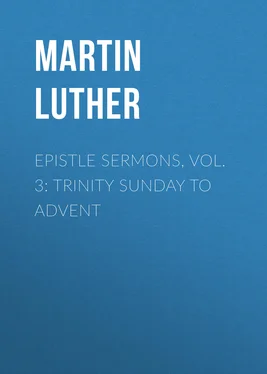Martin Luther - Epistle Sermons, Vol. 3 - Trinity Sunday to Advent
Здесь есть возможность читать онлайн «Martin Luther - Epistle Sermons, Vol. 3 - Trinity Sunday to Advent» — ознакомительный отрывок электронной книги совершенно бесплатно, а после прочтения отрывка купить полную версию. В некоторых случаях можно слушать аудио, скачать через торрент в формате fb2 и присутствует краткое содержание. Жанр: foreign_prose, foreign_religion, Философия, foreign_psychology, foreign_antique, на немецком языке. Описание произведения, (предисловие) а так же отзывы посетителей доступны на портале библиотеки ЛибКат.
- Название:Epistle Sermons, Vol. 3: Trinity Sunday to Advent
- Автор:
- Жанр:
- Год:неизвестен
- ISBN:нет данных
- Рейтинг книги:5 / 5. Голосов: 1
-
Избранное:Добавить в избранное
- Отзывы:
-
Ваша оценка:
- 100
- 1
- 2
- 3
- 4
- 5
Epistle Sermons, Vol. 3: Trinity Sunday to Advent: краткое содержание, описание и аннотация
Предлагаем к чтению аннотацию, описание, краткое содержание или предисловие (зависит от того, что написал сам автор книги «Epistle Sermons, Vol. 3: Trinity Sunday to Advent»). Если вы не нашли необходимую информацию о книге — напишите в комментариях, мы постараемся отыскать её.
Epistle Sermons, Vol. 3: Trinity Sunday to Advent — читать онлайн ознакомительный отрывок
Ниже представлен текст книги, разбитый по страницам. Система сохранения места последней прочитанной страницы, позволяет с удобством читать онлайн бесплатно книгу «Epistle Sermons, Vol. 3: Trinity Sunday to Advent», без необходимости каждый раз заново искать на чём Вы остановились. Поставьте закладку, и сможете в любой момент перейти на страницу, на которой закончили чтение.
Интервал:
Закладка:
29. Such a prayer is pleasing to God, and he tells us to do only what we are commanded, and throw upon him all anxiety as to the issue and what we shall accomplish. As also other passages of Scripture declare: "Commit thy way unto Jehovah, trust also in him, and he will bring it to pass," Ps 37, 5. No heathen, philosopher, jurist, if he have not God's Word, can throw his care and complaint upon God. He thinks that all the world, especially the great, the wise, who rule, must accomplish everything by their own planning and circumspection. And where trouble arises—for it is quite common for even the greatest and wisest people to make mistakes—he becomes a madman or a fool, and begins to murmur and argue against God and his government, as though God's rule merited criticism. But such men receive their deserts when God permits their calculations and hopes to fail, and lets the reverse obtain. For they will not admit they have need of him. They think they have sufficient wisdom and power, and that God must respect their plans. Thus, they spend their lives in many vain, useless cares and projects, and must, in the course of their experience, learn and confess, many a time, that the very opposite of their judgment is the truth.
30. Christians have the rare faculty, above all other people on earth, of knowing where to place their care, whilst others vex and torture themselves and at length must despair. Such must be the consequence of unbelief, which has no God and would provide for itself. But faith understands this word Peter quotes from the Scriptures: "Because he careth for you." It joyfully meditates thereon and does and suffers faithfully. For faith knows this to be its duty. Its trouble, however, it commits to God, and proceeds with vigor against all that opposes. It can call upon God as a father, and it says: I will do what God has commanded me and leave the result with him.
31. The Christian must take this course if he would proceed safely and happily in matters of the highest import. In time of danger and in the hour of death, when, with all his worrying, he cannot discover where he is or how he is journeying, he must, with eyes, senses and thoughts closed to the world, surrender himself in faith and confidence and cast himself upon God's hand and care and protection, and say: God has permitted me to live until this hour, without my solicitude. Moreover, he has given me his beloved Son as a treasure and sure pledge of eternal life. Therefore, my dear soul, journey on in joy. Thou hast a faithful Father and Savior, who has taken thee into his own hand, and will preserve thee.
32. The Christian Church collectively must so proceed in the discharge of its high spiritual office, of which Peter speaks here, that no man or creature, by his own wisdom and power, can sustain or accomplish any work. No power, might, or protection that can comfort, or upon which one may rely, is to be sought in the world. Wholly in God, and in God alone, must help be sought. By his divine power God must uphold the Church. He has, from the beginning, always and wonderfully preserved it in the world, in the midst of great weakness, in disunion occasioned by schismatics and heretics, in persecution by tyrants. And the government is wholly his, though he commits the office and service to men, whom he would summon and use to administer his Word and sacrament. Therefore, each Christian, especially if he fills such an office and partakes of this fellowship, should be intent, in that whereunto God has called and appointed him, upon serving God faithfully and doing that which is commanded him. The anxiety respecting the Church's continued existence and her preservation against the devil and the world, can be left to the Lord. He has taken this upon himself and thus has removed the burden from our shoulders, that we might be certain of the permanence of the Church. If its preservation were committed to human counsel, might and will, the devil, with his power, would soon overthrow and destroy it.
33. Likewise, in every office and station, each one should follow this counsel of Saint Peter. A prince should seek to protect his land and people, to promote God's Word, to maintain discipline and peace, to do justice to every man, to punish the disobedient, etc. Councils, officials, and those in authority should faithfully advise and direct to this end. Pastors and preachers should rightly and fearlessly declare God's Word and truth. Every citizen and subject should be intent upon his work and duty, and whatever, in connection therewith, is unusual he must simply commit to God.
But the world does not pursue this course. Each one says: Why should I incur so much danger, opposition and hostility? Again, why should I labor and toil for naught? I will not accomplish my work at any rate. In this spirit of fear and worry, his proper office and work are delayed, or he is always careless.
But let such people know that they are not Christians, nor do they promote God's kingdom or profit the offices conferred on them. If they do not propose to mend their ways, they should give up the office bestowed on them by God. It is not enough to simply sit at ease in one's office and accept the plaudits of men. We all like to render esteem and honor to office and station. But know this, that you are not in office to parade about in beautiful garments, to sit in the front row, and be called "Gracious Master" and "Esquire." You are to conduct faithfully the office with which God has clothed and honored you, regardless of human honor and profit, shame or injury.
34. But men are not generally inclined to believe and trust God. They are not inclined to remember that he cares for us; that he has assumed and must bear the greatest of burdens, which no man on earth can bear; that he cared for us before we were born, and could still, of himself, execute all things dispensing with all human help, but he prefers to accomplish his purpose through human means, and to employ us as instruments in these divine works—governing, punishing, teaching, comforting.
35. The world is particularly culpable in this matter of pride. When divinely charged with some great work, it always seeks to determine, in advance, by its own wisdom, all future danger and accidents, and tries to anticipate them. The world looks for man's help, and seeks friendship and assistance wherever it can. It makes alliances, and resorts to other schemes. It puts its trust in these and then considers itself strong enough to meet opposition, and is sure of its cause by reason of its own efforts. This is not showing faith in God. It is not committing our cause and all care for ourselves to him. It is maintaining the cause through one's own anxiety and forethought. It is ignoring and disbelieving the fact that nothing can be accomplished by one's own vexed effort. No human wisdom has power to foresee the future. If we looked back at the examples furnished by history, we should learn how woefully human wisdom is deceived when it relies upon itself. The results are not what was expected, but the very opposite.
36. The Scriptures give many pertinent examples of the kings of Judah and Israel, whom the prophets often and severely rebuked because they sought refuge and help among strange nations and kings. The prophets warned them that they should not trust in human aid, but should do according to God's Word and command. They told them he would protect and uphold them. But the kings would not hear. They continued to form friendships and alliances with the kings of Egypt, Syria, Babylon and Assyria, and thus invited them as guests into the land, whereupon the heathen kings came with force and led away captive the inhabitants and laid everything desolate. That was their reward for not heeding God's Word; for not believing that he cared for them, and desired to protect and defend them if they would but trust and obey him.
Читать дальшеИнтервал:
Закладка:
Похожие книги на «Epistle Sermons, Vol. 3: Trinity Sunday to Advent»
Представляем Вашему вниманию похожие книги на «Epistle Sermons, Vol. 3: Trinity Sunday to Advent» списком для выбора. Мы отобрали схожую по названию и смыслу литературу в надежде предоставить читателям больше вариантов отыскать новые, интересные, ещё непрочитанные произведения.
Обсуждение, отзывы о книге «Epistle Sermons, Vol. 3: Trinity Sunday to Advent» и просто собственные мнения читателей. Оставьте ваши комментарии, напишите, что Вы думаете о произведении, его смысле или главных героях. Укажите что конкретно понравилось, а что нет, и почему Вы так считаете.












